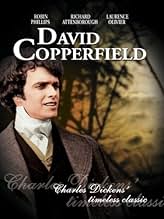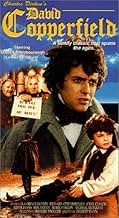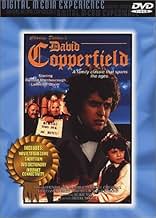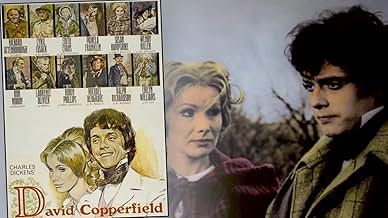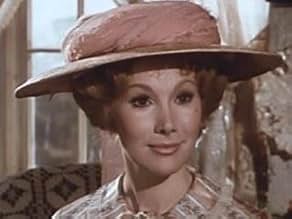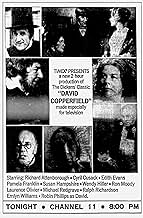Ajouter une intrigue dans votre langueThe legendary novel by Charles Dickens comes to life in this colorful interpretation directed by Delbert Mann.The legendary novel by Charles Dickens comes to life in this colorful interpretation directed by Delbert Mann.The legendary novel by Charles Dickens comes to life in this colorful interpretation directed by Delbert Mann.
- Réalisation
- Scénario
- Casting principal
- Nommé pour 3 Primetime Emmys
- 4 nominations au total
Avis à la une
This film felt longer than it was. The acting and scenery were certainly enjoyable, but the story was difficult to get into. (I have not read the book.) Eventually I found it compelling enough to keep watching to the end. The characters' interactions were good and I became interested enough to wonder what Copperfield's shallow despair was all about and what would happen. On hindsight I agree with a previous reviewer that the flashback device created a character of Copperfield that was out of character with his life in flashbacks. What I really hated about the film was the awful perms on the lead and the heavy eye makeup on the beautiful women. I guessed this film had to have been made in the early 1970s. I was close. I actually felt relief when Copperfield came out of the water and his hair was plastered to his head instead of all poofed out and neatly clipped. Hardly Dickensonian.
Delbert Mann's version of David Copperfield is one of these lavish all star adaptations made for the network American television market. Laurence Olivier and Richard Attenborough just turn up for a few scenes.
Mann should be applauded for attempting to try a different approach to this often adapted story. It is told in flashback by an adult Copperfield who reflects in his life and relationships. It also shies away from the traumatic abuse David suffers from the Murdstones and the boarding school he attends. So credit should be given for avoiding the poverty porn which some directors would had gone full board on, although this may be part of the censorship that existed at the time in US network television.
However it is too truncated leaving me dissatisfied to a story that has been shredded. Some actors look too old for the parts they are playing such as Ron Moody as Uriah Heep and Ralph Richardson as Mr Micawber. It does not help that Robin Phillips is bit bland as the lead and comes across as a bit of a wet fish.
The version of the film I saw was of poor quality, it was in desperate need of restoration. A shame given that the film has theatrical knights/dames such as Olivier, Redgrave, Richardson, Attenborough, Hillier, Evans.
Mann should be applauded for attempting to try a different approach to this often adapted story. It is told in flashback by an adult Copperfield who reflects in his life and relationships. It also shies away from the traumatic abuse David suffers from the Murdstones and the boarding school he attends. So credit should be given for avoiding the poverty porn which some directors would had gone full board on, although this may be part of the censorship that existed at the time in US network television.
However it is too truncated leaving me dissatisfied to a story that has been shredded. Some actors look too old for the parts they are playing such as Ron Moody as Uriah Heep and Ralph Richardson as Mr Micawber. It does not help that Robin Phillips is bit bland as the lead and comes across as a bit of a wet fish.
The version of the film I saw was of poor quality, it was in desperate need of restoration. A shame given that the film has theatrical knights/dames such as Olivier, Redgrave, Richardson, Attenborough, Hillier, Evans.
I found this DVD at the dollar store, where it was, if you can believe it, on sale at 50 cents. You wouldn't expect much and I wasn't disappointed at what I got.
Although there are some sparkling portrayals, the movie was long, muddy, and hard to watch. Some of this had to do with the poor reproduction by the distributor, Digiview. The rest related to the fact that I hadn't read the book so the 101 story lines going off in all directions were confusing, especially when held together only by the title character walking up and down the beach, and alternately scowling and muttering.
Worth every cent ... and not a pence more.
Although there are some sparkling portrayals, the movie was long, muddy, and hard to watch. Some of this had to do with the poor reproduction by the distributor, Digiview. The rest related to the fact that I hadn't read the book so the 101 story lines going off in all directions were confusing, especially when held together only by the title character walking up and down the beach, and alternately scowling and muttering.
Worth every cent ... and not a pence more.
According to IMDb, there have to date been 388 film and television adaptations of books by Charles Dickens, but the treatment of his works has been very uneven. A remarkably high proportion of those adaptations are based (sometimes very loosely) upon his novella "A Christmas Carol", which seems to inspire at least one film every festive season, and many of the others are derived from either "Oliver Twist" or "Great Expectations". Although "David Copperfield" is one of Dickens's best-known novels, it has proved less popular, at least in the cinema. (There have been a number of TV adaptations). To the best of my knowledge the 1935 version with Freddie Bartholomew and W.C. Fields, which I have never seen, remains the only feature-film version since the coming of sound. This version from 1970 is of feature-film length but was made for television.
"David Copperfield" is often described as an "autobiographical novel", and some of David's experiences, such as his time in the bottling factory and the fact that he eventually becomes a writer, do indeed reflect the author's own. Indeed, it is said that Dickens deliberately gave his hero his own initials, albeit reversed. In one important respect, however, it is not autobiographical. Dickens was 39 when his father died, and his mother only predeceased him by seven years. David's father, however, dies before he is even born, and his mother dies while he is still a boy. It is notable that a number of Dickens's other heroes, such as Oliver Twist and Pip in "Great Expectations" are also orphans. I wonder what psycho-analysts would make of this fact.
The plot is a complex one, and I will not try to summarise it in this review. The film-makers try and keep most of the main features of the novel, but even so there are some odd gaps. One minute, for example, David is a child, a penniless vagabond who has just run away from the bottling factory in search of his aunt (his last surviving relative), the next he is not only an adult but also, it would seem, a young man of some means and social standing, and it is never explained how this transformation has taken place. Although Mr Micawber (a character said to be based upon Dickens's father) appears, the episode in which he is imprisoned for debt is cut from the film, so he never comes across as the improvident spendthrift described by Dickens.
The cast includes some of the leading British actors of the period, such as Laurence Olivier, Richard Attenborough and Edith Evans, mostly in cameo roles. Michael Redgrave has a more substantial role as Daniel Peggotty, as does Ralph Richardson as Micawber. Some on this board have described Robin Phillips (an actor I have not come across in any other films) as "dull", but I thought he made David a very personable young man. There are good performances from Pamela Franklin as the beautiful but empty-headed Dora and from Redgrave's son Corin as Steerforth, but Ron Moody never makes the same impression as Uriah Heep as he had done playing another Dickensian villain, Fagin in "Oliver!" which had appeared a couple of years previously. Susan Hampshire's Agnes is rather colourless, but the fault here probably lies with the author rather than the actress. Dickens's virtuous young heroines are never his most convincing creations.
Dickens' story is a good one, which can stand a certain amount of rough treatment at the hands of film-makers, which is why I have given this version an above-average mark. It does, however, confirm my view that Dickens is not the most cinematic of authors. There is a reason why so few feature films have been based upon this and some of Dickens's other novels. They are so long and so packed with incidents and characters that there is just not room to do them justice in the traditional two-hour (or two-and-a-half-hour) slot. "Oliver Twist" and "Great Expectations" are, relatively speaking, shorter and simpler, which is why they tend to be exceptions to the rule. His longer novels tend to work better as television mini-series, and a number of very good Dickens adaptations have been made in this format, particularly by the BBC. 6/10
"David Copperfield" is often described as an "autobiographical novel", and some of David's experiences, such as his time in the bottling factory and the fact that he eventually becomes a writer, do indeed reflect the author's own. Indeed, it is said that Dickens deliberately gave his hero his own initials, albeit reversed. In one important respect, however, it is not autobiographical. Dickens was 39 when his father died, and his mother only predeceased him by seven years. David's father, however, dies before he is even born, and his mother dies while he is still a boy. It is notable that a number of Dickens's other heroes, such as Oliver Twist and Pip in "Great Expectations" are also orphans. I wonder what psycho-analysts would make of this fact.
The plot is a complex one, and I will not try to summarise it in this review. The film-makers try and keep most of the main features of the novel, but even so there are some odd gaps. One minute, for example, David is a child, a penniless vagabond who has just run away from the bottling factory in search of his aunt (his last surviving relative), the next he is not only an adult but also, it would seem, a young man of some means and social standing, and it is never explained how this transformation has taken place. Although Mr Micawber (a character said to be based upon Dickens's father) appears, the episode in which he is imprisoned for debt is cut from the film, so he never comes across as the improvident spendthrift described by Dickens.
The cast includes some of the leading British actors of the period, such as Laurence Olivier, Richard Attenborough and Edith Evans, mostly in cameo roles. Michael Redgrave has a more substantial role as Daniel Peggotty, as does Ralph Richardson as Micawber. Some on this board have described Robin Phillips (an actor I have not come across in any other films) as "dull", but I thought he made David a very personable young man. There are good performances from Pamela Franklin as the beautiful but empty-headed Dora and from Redgrave's son Corin as Steerforth, but Ron Moody never makes the same impression as Uriah Heep as he had done playing another Dickensian villain, Fagin in "Oliver!" which had appeared a couple of years previously. Susan Hampshire's Agnes is rather colourless, but the fault here probably lies with the author rather than the actress. Dickens's virtuous young heroines are never his most convincing creations.
Dickens' story is a good one, which can stand a certain amount of rough treatment at the hands of film-makers, which is why I have given this version an above-average mark. It does, however, confirm my view that Dickens is not the most cinematic of authors. There is a reason why so few feature films have been based upon this and some of Dickens's other novels. They are so long and so packed with incidents and characters that there is just not room to do them justice in the traditional two-hour (or two-and-a-half-hour) slot. "Oliver Twist" and "Great Expectations" are, relatively speaking, shorter and simpler, which is why they tend to be exceptions to the rule. His longer novels tend to work better as television mini-series, and a number of very good Dickens adaptations have been made in this format, particularly by the BBC. 6/10
As much as I love the story of David Copperfield, I cannot claim to have enjoyed this movie. It was probably the second worst movie I have ever seen. One problem I see is that the magnitude of the novel asks for a miniseries of several hours, rather than a regular movie. It is just impossible to capture a significant amount of the events that take place in the story in two hours. I dis not enjoy the brooding flashback format. It was disjointed and would be impossible for someone who did not already know the story to fully grasp. Also, I don't think the filmmakers interpreted Copperfield's personality correctly. The idea of him strolling around on a beach moaning about his life seems inconsistent with the proactive, forward-thinking nature Dickens gave him in the novel. Agnes also bothered me. She came across as a ditsy household decoration, rather than a strong woman. Dora was perfect, however. This movie was fraught with problems, and I wait eagerly for someone to make a decent screen version.
Le saviez-vous
- AnecdotesReleased as a theatrical movie in Europe, this premiered as an NBC television special in the U.S.
- Citations
Mr. Quinion: You can sleep in yer own time! This is Mr Micawber. You're to lodge with him.
Mr. Micawber: Under the impression that your peregrinations in this metropolis have not as yet been extensive, allow me to assist you in penetrating this modern Babylon as far as my lodgings in the City Road...
- Crédits fousCredits look like the original illustrations by Phiz, but are in fact pastiches by Mel Isaacson using the faces of the actors in their roles.
- ConnexionsReferenced in Cinema: Sir Laurence Olivier (1970)
Meilleurs choix
Connectez-vous pour évaluer et suivre la liste de favoris afin de recevoir des recommandations personnalisées
Détails
- Date de sortie
- Pays d’origine
- Langue
- Aussi connu sous le nom de
- Charles Dickens' David Copperfield
- Lieux de tournage
- Sociétés de production
- Voir plus de crédits d'entreprise sur IMDbPro
- Durée
- 1h 58min(118 min)
- Mixage
- Rapport de forme
- 1.33 : 1
Contribuer à cette page
Suggérer une modification ou ajouter du contenu manquant

